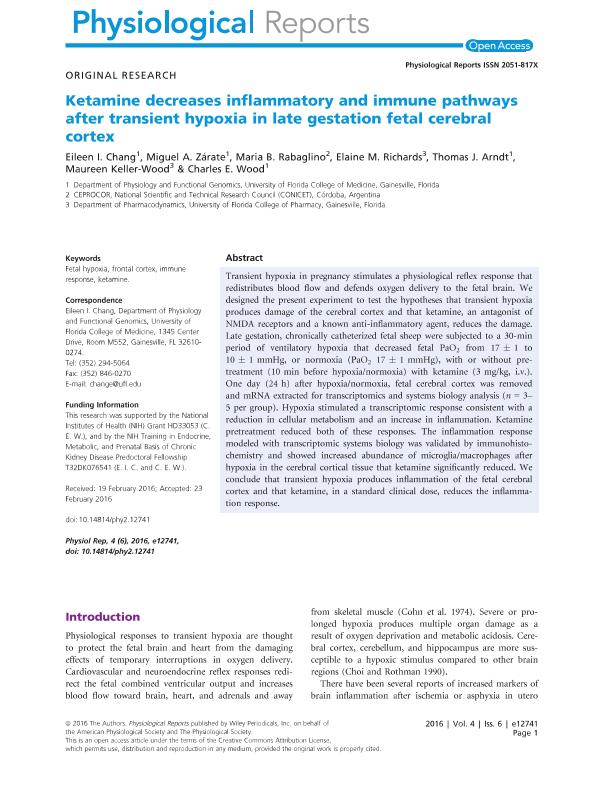Artículo
Ketamine decreases inflammatory and immune pathways after transient hypoxia in late gestation fetal cerebral cortex
Chang, Eileen I.; Zárate, Miguel A.; Rabaglino, Maria Belen ; Richards, Elaine M.; Arndt, Thomas J.; Keller Wood, Maureen; Wood, Charles E.
; Richards, Elaine M.; Arndt, Thomas J.; Keller Wood, Maureen; Wood, Charles E.
 ; Richards, Elaine M.; Arndt, Thomas J.; Keller Wood, Maureen; Wood, Charles E.
; Richards, Elaine M.; Arndt, Thomas J.; Keller Wood, Maureen; Wood, Charles E.
Fecha de publicación:
03/2016
Editorial:
Wiley Blackwell Publishing, Inc
Revista:
Physiological Reports
ISSN:
2051-817X
Idioma:
Inglés
Tipo de recurso:
Artículo publicado
Clasificación temática:
Resumen
Transient hypoxia in pregnancy stimulates a physiological reflex response that redistributes blood flow and defends oxygen delivery to the fetal brain. We designed the present experiment to test the hypotheses that transient hypoxia produces damage of the cerebral cortex and that ketamine, an antagonist of NMDA receptors and a known anti-inflammatory agent, reduces the damage. Late gestation, chronically catheterized fetal sheep were subjected to a 30-min period of ventilatory hypoxia that decreased fetal PaO2 from 17 ± 1 to 10 ± 1 mmHg, or normoxia (PaO2 17 ± 1 mmHg), with or without pretreatment (10 min before hypoxia/normoxia) with ketamine (3 mg/kg, i.v.). One day (24 h) after hypoxia/normoxia, fetal cerebral cortex was removed and mRNA extracted for transcriptomics and systems biology analysis (n = 3-5 per group). Hypoxia stimulated a transcriptomic response consistent with a reduction in cellular metabolism and an increase in inflammation. Ketamine pretreatment reduced both of these responses. The inflammation response modeled with transcriptomic systems biology was validated by immunohistochemistry and showed increased abundance of microglia/macrophages after hypoxia in the cerebral cortical tissue that ketamine significantly reduced. We conclude that transient hypoxia produces inflammation of the fetal cerebral cortex and that ketamine, in a standard clinical dose, reduces the inflammation response.
Palabras clave:
FETAL HYPOXIA
,
FRONTAL CORTEX
,
IMMUNE RESPONSE
,
KETAMINE
Archivos asociados
Licencia
Identificadores
Colecciones
Articulos(CCT - CORDOBA)
Articulos de CTRO.CIENTIFICO TECNOL.CONICET - CORDOBA
Articulos de CTRO.CIENTIFICO TECNOL.CONICET - CORDOBA
Citación
Chang, Eileen I.; Zárate, Miguel A.; Rabaglino, Maria Belen; Richards, Elaine M.; Arndt, Thomas J.; et al.; Ketamine decreases inflammatory and immune pathways after transient hypoxia in late gestation fetal cerebral cortex; Wiley Blackwell Publishing, Inc; Physiological Reports; 4; 6; 3-2016; 1-15
Compartir
Altmétricas



